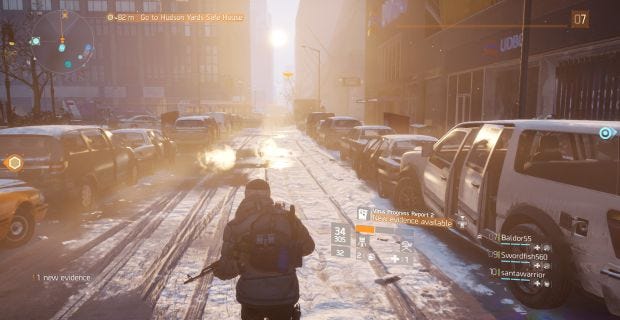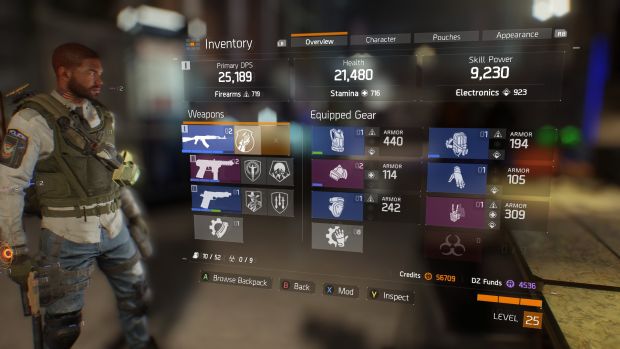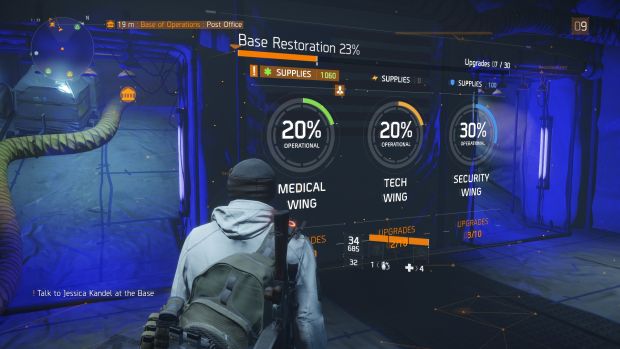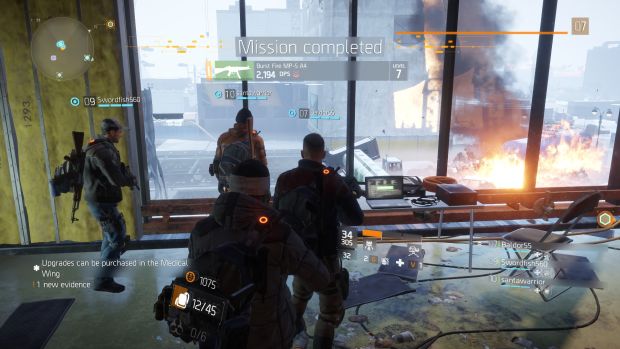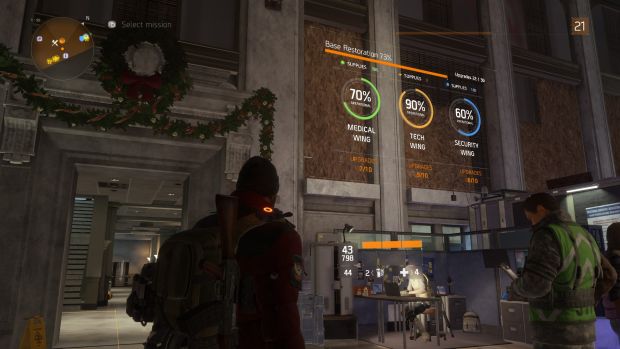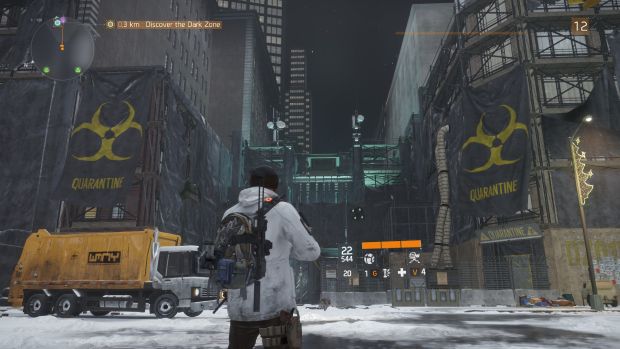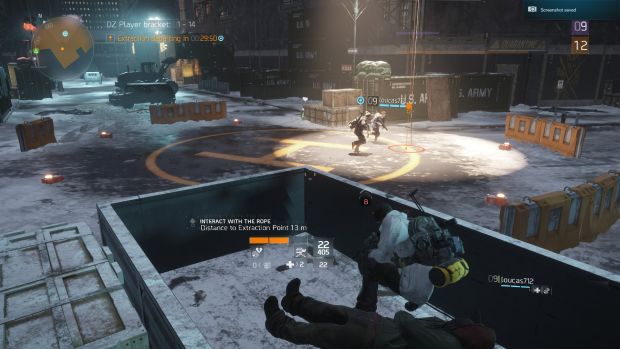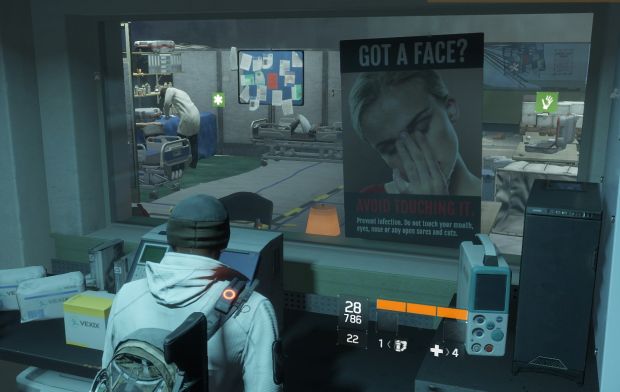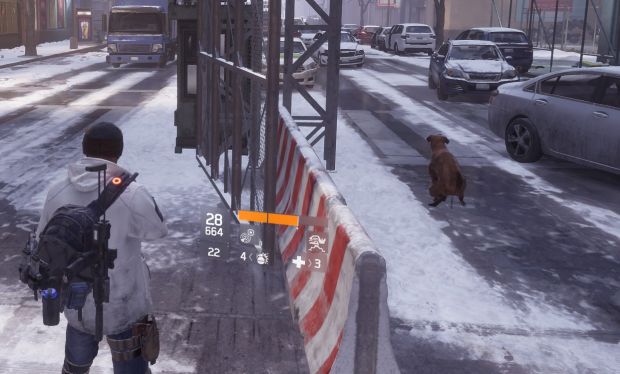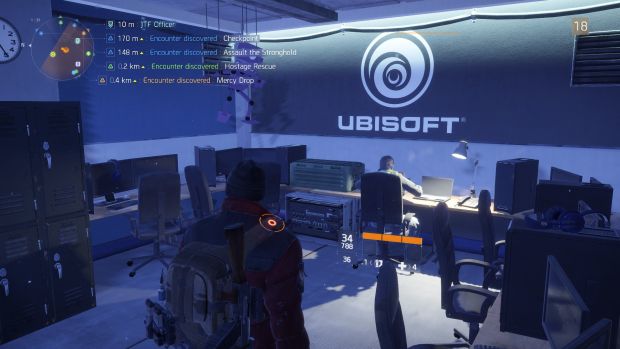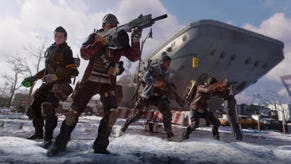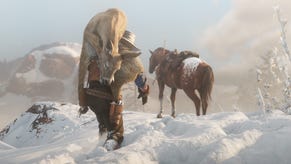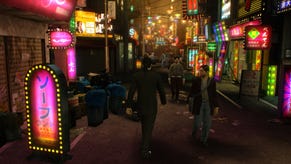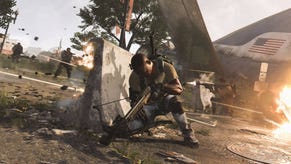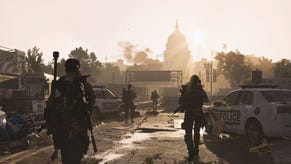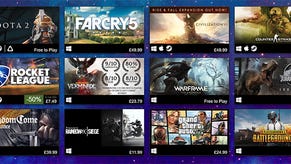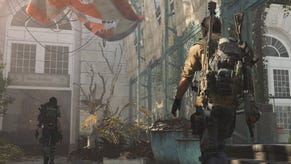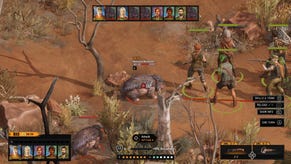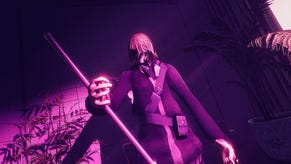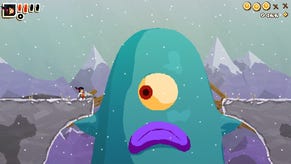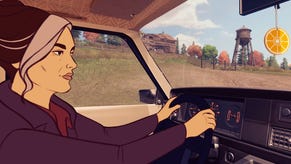Wot I Think: Tom Clancy's The Division
Fun while it lasts.
The Division came out last week, breaking Ubisoft sales records and causing all civilised behaviour between RPS staff members to break down. Sleeper agent Brendan was activated and ordered to clean up the mess. Let's see wot he thinks.
I shot wildly and inaccurately at level 5 and was enjoying The Division. At level 19, I was grinding side missions and was not enjoying The Division. At level 23 I was sending little seeker drones full of explosives into rooms packed with angry men (I was enjoying The Division again). I could write the whole review like this but I think it would get a little repetitive.
The world as we know it has broken down, or rather, New York as we know it has broken down. As an agent of a super secret wing of the military you are tasked with cleaning up the streets, along with the thousands of other punters prancing about this open quasi-MMO world. Working alone or in a team you have to restore order to a city in the midst of collapse. Mostly, you achieve this by shooting at men from behind cover.
This cover system is fairly robust and mercifully glitch free. Aim at a piece of cover in range and hold 'A' (I'm using a game pad) and your character will leap out and follow a thin automated line until they reach it, weaving around obstacles and scuttling behind trash cans like a rat. To round a corner while in cover you simply hold the stick in its direction for a few moments. Given how important these controls are to the game it is a relief to see them function so well. Going into the streets of NYC I was not expecting to enjoy much of Clancy's new shooty bang, but being able to dodge from car bonnet to car bonnet without it feeling "sticky" or "floaty" was the first of my pleasant surprises.
Retaking the streets is the main objective. There are three main groups of dopes out there trying to stop you. The Rikers are a group of escaped convicts, the Last Man Battalion is a group of private sector mercenaries, and the Cleaners are a group of city workers trying to torch all remnants of the virus. You'll also have to deal with rioters and hoodlums, nothing but disorganised bands of YOUTHS. Each group has its own flavour and they all sport distinct classes of bad dude. There are snipers, elite soldiers with armour, grenadiers, heavy machine gunners, flame thrower creeps and men with baseball bats who like to bum rush you when you're not looking. They all have helpful icons over their heads next to their health bar to let you know their type as you shoot them. And when you do this you will see that the enemies in The Division do not bleed blood like you and I. They bleed numbers.
That's because Tom Clancy's apocalypse-in-progress is Ubisoft's answer to Destiny. What Bungie did to the first-person shooty-bang and traditional MMO, the Jolly French Giant is doing to the cover shooter. All the same principles are being applied here. Shoot at the bad guys to see the numbers spill out of them like guts. Then run over to their corpse and salvage whatever loot you can. Enemies drop new guns, armour, weapon mods as well as your bread and butter ammo and med kits. Getting yourself kitted out in the inventory is a busy mess of percentages, arithmetic and level requirements.
In fact "busy" is a word that can be applied to the entirety of the screen at any time, mission objectives and information is constantly plastering itself over the gorgeous ruins of Manhattan. It was a couple of hours until my eyes stopped instinctively wrestling with all the information. After that, I knew what I was doing and dropping into my Base of Operations to sell loot and recalibrate all my bits 'n' pieces became a welcome rest from all the panicked hipfiring.
This headquarters, incidentally, is the whole hook of the game. Walk in to the Base of Operations and this is the wall that greets you.
These three unfinished circles, each with a giant percentage in the centre, are either a masterstroke of MMO design philosophy or the result of some Faustian pact between Ubisoft and the devil. Every story mission you complete for the folks in your Base gets you resources to spend on one of three wings of the building - Medical, Tech or Security. For instance, you might get medical resources and spend them to build a pharmacy. Or you might construct a canine unit in the blue Security wing. As you upgrade the building you gain skills (things you can use or deploy in battle), abilities (stat boosts under certain conditions, like low health) and perks (passive and permanent effects).
The tech wing, for instance, grants you a mobile turret that you can throw and deploy anywhere with one of the bumper buttons. Subsequent upgrades allow this turret to belch flames, or grant it a better range. One medical upgrade grants you an aid station to throw down for area-of-effect healing. The biggest upgrade of every wing is an additional uber-skill, activated by pressing both bumpers, granting huge buffs to nearby squad mates. The building also houses vendors where you can buy and sell weapons, armour and mods. The mods slot into your guns - suppressors that reduce recoil, scopes that increase accuracy damage or increase XP gained from headshots, magazines that offer more bang for your buck. Some armour also comes with mod slots, granting bonuses or increases to one of your three main attributes: Firearms, Stamina or Electronics. Yes, the old triumvirate of MMOs is alive and well here. My brain could not help but translate these, when I first saw them, into Damage, Health and Magic.
As you upgrade your building and, by association, your character, you see the environment of the Base itself change. The clinics in the medical wing get staffed with doctors, people line up to receive aid packages, the computer rooms of the tech wing become buzzing with nerds. Adam and Graham have grumbled about having to run around inside your base, collecting the items that your new facilities collect for you (fabric to craft gear, salvaged loot, incendiary ammo). But for me this feels like the good kind of housekeeping. I would rather navigate a real world than a menu any day. And of course, as you upgrade each wing, those big round circles slowly fill up, their percentages goading you to go out there and complete more story missions.
But what happens when there are no more missions? Well, here it is buddy, you're deep in grind country now. The side missions offer a paltry sum of supplies for each wing in comparison to the bigger, badder and far more interesting set pieces of the story missions. So if you find yourself too low a level for a main mission, you have to grind away at the lesser tasks. At the beginning it feels like there is a healthy smattering of side mission types - rescue the hostages, defend the supplies, collect the goodies, secure the area. But these soon begin to noticeably repeat themselves. There are seemingly endless collectibles to find. Phone call recordings, pages from a survival guide, watches from missing agents, and so on. But collecting even the most interesting of these - the "echoes", short glimpses of storyline - is no substitute for the real thing. When these grindy plateaus come, they are painful. But when you get back to the story missions, everything becomes okay again.
You don't have to do the side missions, of course. There is another option: the Dark Zone. This is a giant portion of the city marked in deep red on your map. It is where the other players live. Because, for all of The Division's posturing as a lawless land of reprobates and murderers, it only lets you meet other random players in Safehouses (where guns are disabled) or in the Dark Zone. You can roam the rest of the "normal city" in a matchmade group, but your group will never meet another group there. You can wander it alone, but you will never see another human person. This is the game's way of dividing PvP and PvE and it kind of works.
You enter the Dark Zone through one of many checkpoints, where you get a yellow bag that can hold only a small cache of loot, about six to eight items. Loot in the Dark Zone is generally higher level than outside the walls. However, these items can't be taken back out of the Zone through the checkpoints (because they are contaminated, duh) and if you die, they will drop with your corpse. They have to be "extracted". You go to an extraction point and fire a flare to call a chopper, which will arrive in two minutes and take all your loot away, clean it for you, and drop it in your stash at HQ. The gist here is that both NPC nasties AND other players are alerted when you fire the flare. They can all come and get you, and take your stuff for themselves.
Any player can also "go rogue" by killing another, earning them a bounty. If you kill a rogue player you get the bounty, paid in special Dark Zone funds. If the rogue player survives until the end of a timer above their heads, they get the bounty themselves. More kills increases both the amount of Dark Zone funds and the time the rogue must survive. These Dark Zone dollars can only be spent on items from vendors at the entry checkpoints (and later from a specialist at your HQ). Mobs roaming the Dark Zone will also sometimes drop keys letting you unlock chests secreted away in certain buildings.
Generally, this is all great fun. It was definitely the highlight of my last few days with the game, giving a sense of danger and urgency to the city. But there are some downers. I murdered my way through the Dark Zone one evening, befriending and betraying many people and earning a lot of DZ dosh. But when I emerged at a checkpoint, I discovered I couldn't spend anything because I couldn't afford even the cheapest weapons I wanted, nor was I the requisite "Dark Zone rank" - a leveling system totally separate from your rank on the "outside". It was like going into one of those terrible arcades where the machines print little tickets, then getting to the exchange desk and discovering you only have enough tickets for a single, malty lollipop.
Despite this bit of grind, I did have a good time in the Zone. But, like I said, it only kind of works. I very rarely saw other rogue agents and often saw swarms of players working in tandem, or simply ignoring one another. The bounty system and promise of loot doesn't seem like it's enough to encourage people to turn into the necessary villains. When I was with a group who went rogue, they simply did it to find out what happened. Once it was over, it was clear that there was far more profit to be had in farming the NPCs. After all, there was no scarcity of them, and no scarcity of loot. And, unlike going rogue, killing the AI characters didn't often end with the three of us hiding behind dumpsters waiting for the time to tick down.
In reality, the most villainous things players are doing in the Dark Zone is purposefully walking in front of you as you fire at an NPC so that the game marks you as "rogue", allowing them to kill you without recourse, all because of a few stray bullets. This is what happens when blockbuster publishers try to harness the atmosphere of DayZ and its ilk without truly surrendering control to the players. I'm sad that Ubisoft felt the need to segregate the community into PvE and PvP at all, and to water down all motivation to turn into a bastard. I would rather the whole city be a "Dark Zone". But I also think I'm an outlier in this regard. As the Assassin's Creed series shows, Ubisoft's multiplayer modes often strafe the unusual, as opposed to embracing it outright. And people seem to like it.
I should also add that I experienced just as much peril, if not more, running into PvE areas of the city where the enemies were FAR above my level, in an effort to locate and unlock each safehouse. This feeling of making your way from one part of an embattled city to another, a la Escape from New York, is a feeling I want to see replicated more often in games, and even if I just invented this little tour-of-the-map "game mode" myself, I'm glad it can be done.
Reading this, you might think I have mixed feelings. Really, I have mostly-good feelings. I have all the same problems with The Division as I had with its closest bedmate, Destiny. The transparency of its bit-by-bit progression system, the gating of areas by level, the sponginess of its enemies, its reliance on scrubbing the map clean of icons, all designed to make you grind first and think later. And yet I enjoy it a lot more than the latter.
I think this is all down to the setting and the fine detail of the streets. In Destiny, you get Peter Dinklage nattering on about "the light" and "the darkness" and any other fantasy sci-fi cliché you can pull out of your cryo tube. In The Division you get enemies with motives, a world with a reason for being the way it is, and bosses with some semblance of character. I'm not saying there are no clichés (a virus has run amok). It's just that they are of a much higher quality.
There are also some surprisingly fun minor characters. The handlers at each safehouse have some of the best lines in the game. For example, one of them is morbidly philosophical, thanking you for keeping civilians safe, then postulating aloud over the radio the relativity of words like "safe". Another speaks only in New Age self-improvement jargon, congratulating you for helping the district reach "self actualisation". It is a relief that something so deadpan has included some lightness like this around the edges. There are lots of other neat details. Here is a health poster that made me smile. "Got a face?" it reads. "AVOID TOUCHING IT."
Here is a dog pooping in the street.
I'm not being flippant when I draw attention to these. I genuinely appreciate tiny details like this. It reveals the underlying tone of the game, a smirking tone. It is something that Destiny could never muster for me, even if the flow and feel of its firefights are sometimes better.
There are other reasons I should dislike The Division. It's repetitive, the XP plateaus suck, and the enemies soak up bullets like they're eating them. There is an entire wing of skills offering riot shields and deployable cover that nobody - I mean NOBODY - ever uses because there is already cover absolutely everywhere. I do not know why these skills are in the game. There are also a lot of Ubisoft's sneaky design elements, like the way some side missions will activate if you are even remotely nearby, without consulting you on whether or not you want to do them, assaulting you with objective markers and voiceover demands and HUD elements, leaving you with that begrudging sense of obligation to drop what you had planned, not out of curiousity or innocent distraction, but just to tidy away all the icons filling up your screen. Just because: "Well, I'm here now. I might as well."
And yet, there is something about it all that I appreciate. Maybe because it looks stunning and I'm a sucker for the apocalypse. Maybe I am a simple human and the psychological tricks of the MMO-shooter hybrid have just done their job. If the DLC (when it finally arrives for us PC folk) gives the side missions more flavour and spices up the Dark Zone, I will very likely return and grind a little more. Until that time, I may step back from it sooner than the developers may have hoped. I feel like, as much as I'm enjoying it, the side missions and gun farming only has a limited appeal once the story missions are over. And my stomach churns to think of making my way to the level cap just for the sake of ultimate completion. At level 26, I'm enjoying The Division. At level 30, I'm worried it'll get repetitive.
The Division is out now for Windows and available from Steam, Uplay and elsewhere.
